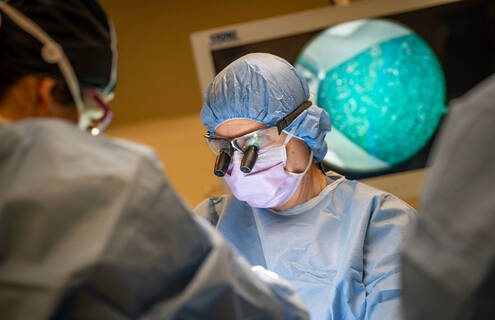
With effective treatment for amyloidosis now available, early diagnosis can save lives. That's why this research is so crucial.
Thara S. Ali, MDCardiologists, orthopaedic surgeons, and pathologists at Dartmouth Health’s Dartmouth Hitchcock Medical Center (DHMC) are collaborating on groundbreaking research aimed at identifying early signs of amyloidosis, a progressive and multi-system disorder. This condition occurs when amyloid protein accumulates in various organs, including the heart, internal organs, nervous system, musculoskeletal system, and digestive tract. The goal of this research is to diagnose amyloidosis years before it leads to life-threatening organ failure and other complications.
"Amyloidosis is often underdiagnosed, and by the time a patient presents with cardiac symptoms, the prognosis is very poor, with an average survival of 3-4 years," said Thara S. Ali, MD, cardiovascular fellow at DHMC’s Heart and Vascular Center and study co-investigator. "While there is now an effective treatment available to slow down the progression of the disease, it cannot reverse the damage that has already occurred."
The research team is focusing their research on an often-overlooked location—the hand—in order to detect early evidence of amyloidosis and develop screening guidelines for the condition.
"In larger spaces like the heart, it takes years for amyloid deposits to become significant enough to cause symptoms," said Vincent D. Pellegrini, Jr., MD, orthopaedic hand surgeon and study co-investigator. "However, in the smaller spaces of the hand and wrist, amyloid deposits within the lining of the tendons and nerves may cause symptoms such as trigger finger or carpal tunnel years before cardiac symptoms manifest."
Together, the orthopaedic surgery and cardiology teams have pioneered a protocol to screen all men over the age of 50 and women over the age of 60 who present with symptoms of bilateral carpal tunnel for amyloidosis. This is achieved by performing routine flexor tenosynovial biopsies during carpal tunnel release procedures.
"We believe that the bilaterality of the carpal tunnel presentation indicates a systemic problem, and we know that men tend to develop amyloidosis earlier than women," said Lance G. Warhold, MD, orthopaedic hand surgeon and study co-investigator. "Through our research, we aim to determine who is at the highest risk for amyloidosis and how we can most effectively screen for the condition."
While synovial tissue biopsies for amyloidosis used to be a standard practice during carpal tunnel release procedures performed four decades ago, it fell out of favor due to the lack of effective treatment options and limited patient benefit resulting from early diagnosis.
"If a patient has a positive biopsy for amyloid deposits in the wrist, they may also have detectable deposits in the heart," explained Max J. Biondi, MD, cardiovascular fellow at DHMC’s Heart and Vascular Center and study co-investigator. "When orthopaedic surgeons identify the condition through biopsy, they will refer the patient to cardiology, enabling our team to conduct a comprehensive evaluation, make a diagnosis, and initiate treatment before cardiac symptoms develop. If there is no evidence of amyloid deposits during our evaluation, we can start surveillance imaging."
Ali emphasized the importance of early diagnosis, sharing, "With effective treatment for amyloidosis now available, early diagnosis can save lives. That's why this research is so crucial."
About Dartmouth Health
Dartmouth Health, New Hampshire’s only academic health system and the state’s largest private employer, serves patients across northern New England. Dartmouth Health provides access to more than 2,000 providers in almost every area of medicine, delivering care at its flagship hospital, Dartmouth Hitchcock Medical Center (DHMC) in Lebanon, NH, as well as across its wide network of hospitals, clinics and care facilities. DHMC is consistently named the #1 hospital in New Hampshire by U.S. News & World Report, and is recognized for high performance in numerous clinical specialties and procedures. Dartmouth Health includes Dartmouth Cancer Center, one of only 57 National Cancer Institute-designated Comprehensive Cancer Centers in the nation, and the only such center in northern New England; Dartmouth Health Children’s, which includes the state’s only children’s hospital and multiple locations around the region; member hospitals in Lebanon, Keene, Claremont and New London, NH, and Windsor and Bennington, VT; Visiting Nurse and Hospice for Vermont and New Hampshire; and more than 24 clinics that provide ambulatory and specialty services across New Hampshire and Vermont. Through its historical partnership with Dartmouth and the Geisel School of Medicine, Dartmouth Health trains nearly 400 medical residents and fellows annually, and performs cutting-edge research and clinical trials recognized across the globe with Geisel and the White River Junction VA Medical Center in White River Junction, VT. Dartmouth Health and its more than 13,000 employees are deeply committed to serving the healthcare needs of everyone in our communities, and to providing each of our patients with exceptional, personal care.